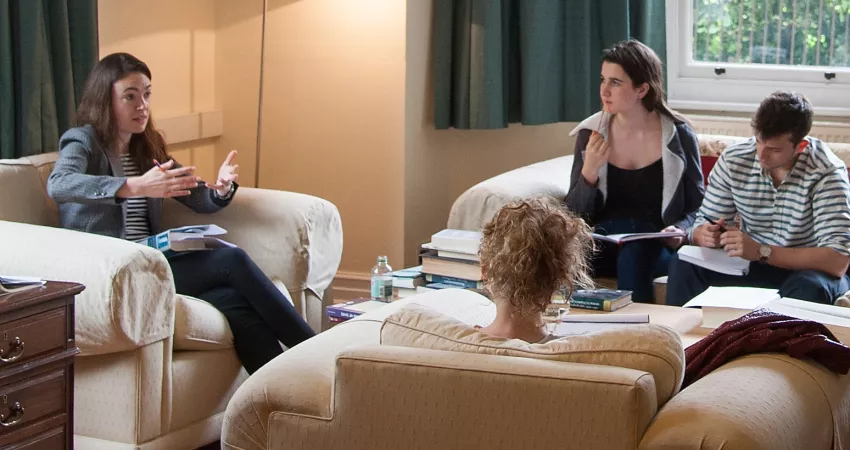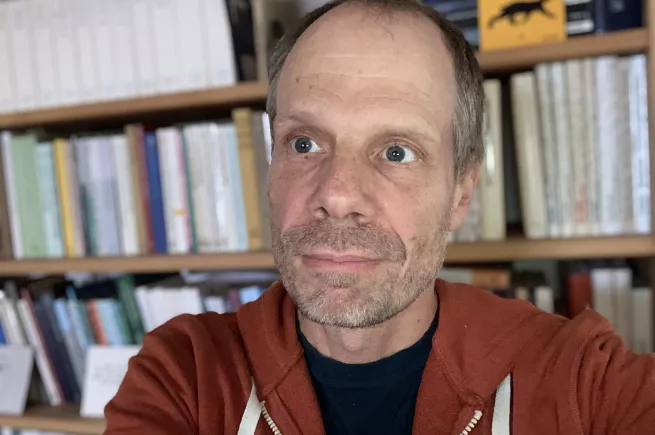Bernhard Malkmus is tutorial fellow of German at New College and took up his post as Professor of German and Environmental Humanities at Oxford in 2023. Prior to that, he held teaching and research positions at Newcastle University, The Ohio State University, Goldsmiths University London, and the Charles University in Prague. He studied on the shores of the River Main (B.A. Würzburg) and of Lake Constance (M.A. Konstanz) and wrote his dissertation at the River Cam (PhD Cambridge). Research fellowships allowed him to develop his ideas in conversation with colleagues at Harvard University, Internationales Forschungskolleg Kulturwissenschaften, Vienna, Rachel Carson Center Munich, Universität Bamberg, Goethe-Universität Frankfurt.
Teaching
Bernhard Malkmus is passionate about education as a form of self-exploration and political empowerment. He teaches papers at all undergraduate stages. Particular teaching interests include Goethezeit & Romanticism; modernity & modernism; literature & ecology; reading cultures, digital cultures & democracy; Germany and Europe. In 2024-25, he gives a lecture series entitled "Of Humans and Other Animals: Reading German Canonical Texts through an Environmental Lens".
He welcomes expressions of interest from prospective graduate students whose curiosity has led them into fields related to his areas of expertise.
Research Interests
His research seeks to develop our understanding of how certain aesthetic forms of expression shape human concepts of nature and human-nature relations. In particular, he is interested in exploring how certain concepts of nature can prove useful in ethical responses to the global ecological crisis – or, conversely, how some concepts may prevent us from engaging with that challenge. He has published widely in the fields of Goethezeit and Romanticism, modernity studies, narratology, and environmental humanities. He is also a nature writer and essayist who publishes regularly in newspapers and magazines. Most recently, he has published a cultural history of the lynx with Matthes & Seitz, Berlin. Current projects include a literary history of the Great Acceleration, provisionally entitled "Menschendämmerung" and a book-length creative writing meditation on extinction, "Die Himmelsstriche der Seeschwalben". As a translator, he has worked on poetry by authors such as W.S. Merwin, Raúl Zurita, Peter Balakian; his completely revised edition of the German translation of Peter Matthiessen's nature writing classic The Snow Leopard came out in 2022.
Selected Publications:
“Wilhelm Lehmann: Nature Writing as a Behavioural Strategy”, in: German-Language Nature Writing from Eighteenth-Century to the Present: Controversies, Positions, Perspectives, ed. Christine Kanz and Gabriele Dürbeck. London: Palgrave Macmilan 2024, 207-232.
‘Romantik und die Leiblichkeit der Musik’. In Roland Borgards and Frederike Middelhoff (eds.): Romantische Ökologien. Heidelberg: Metzler 2023, 83-103.
‘Vom Ausrotten erzählen’, Sinn und Form 75 (6/2023), 780-785.
‘W.G. Sebald and the Concept of Natural History’. In Uwe Schütte (ed.): W.G. Sebald in Context. Cambridge: Cambridge University Press 2023, 102-109.
Luchse: Ein Portrait [a cultural history of the lynx]. Berlin: Matthes & Seitz 2022.
Robert Walser, Seeland. Berner Ausgabe, with Peter Stocker. Berlin: Suhrkamp 2022.
‘The Pampas as Zero Landscape: Alexander von Humboldt, Johann Moritz Rugendas, and César Aira’, Modern Language Review 116 (2021): 527-52.
‘Anthropomorphism and Alterity’. In Gabriele Dürbeck and Philip Hüpkes (eds): Narratives of Scale in the Anthropocene: Imagining Human Responsibility in an Age of Scalar Complexity. London: Routledge 2021.
‘Safe Conduct: The Anthropocene and the Tragic‘. In Gabriele Dürbeck and Philip Hüpkes (ed.): The Anthropocenic Turn. London: Routledge 2020, 93-112.
‘Sceneries in Robert Walser’. In Samuel Frederick and Valerie Hefernan (eds): A Companion to Robert Walser. Evanston: Northwestern University Press 2018, 171-89.
‘Man in the Anthropocene: Max Frisch’s Environmental History’. PMLA 132/1 (2017), 1152-65.
The Challenge of Ecology to the Humanities: Humanism or Posthumanism?, co-edited with Heather Sullivan. New German Critique, special issue 115/2 (2016).

Read more about our tutorial system and what it offers all of our students.
Discover more about New College
Find out more about what it is like studying at one of the largest but friendliest Colleges in Oxford.



